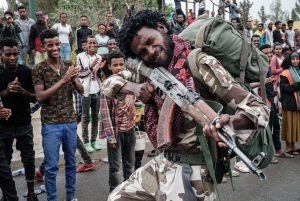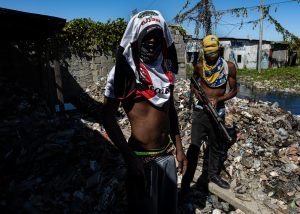The Office of the Director of National Intelligence has released its annual threat assessment based on the input from the United States intelligence community. This article will focus on key regions poised for intrastate turmoil, which the assessment described as “domestic unrest, economic discontent, or governance challenges” that can “fuel cycles of violence, insurgencies, and internal conflict.”
The Balkans:
The first region mentioned in the assessment is the Balkans, specifically western countries in the region, which will “probably will face an increased risk of localized interethnic violence during 2024.”
“Nationalist leaders are likely to exacerbate tension for their political advantage and outside actors will reinforce and exploit ethnic differences to increase or protect their regional influence or thwart greater Balkan integration into the EU or Euro–Atlantic institutions.”
The assessment highlights two main issues: Conflict between Serbs and Kosovars and increasing political tensions between the Republic of Srpska and Federation of Bosnia and Herzegovina.
While the history between Serbs and Albanian Kosovars has been rife with ethnic violence for decades, tensions between Kosovo and Serbia saw a drastic increase in ethnic and political tensions in 2023 due to a domino effect of events. While ethnic and political tensions have persisted heavily since the Kosovo War, they have increased due to a political spat over ethnic-Albanian Kosovar authorities attempting to ban Serbian license plates issued before 1999, which are almost exclusively used by ethnic-Serbs in northern Kosovo. This lead to ethnic-Serbian police officers, judges, and government officials in Serb-majority municipalities in Kosovo resigning en masse in protest, spurring fears of increased ethnic violence and political volatility
.
Due to the resignations, snap elections were to be held in December 2022 in northern Kosovo in the ethnic-Serb municipalities and Albanian-Kosovar officials deployed special police forces to the Serb-majority municipalities “to provide security for all citizens,” however, their presence unsurprisingly led to a flare up of tensions and clashes, which ultimately caused the elections to be postponed until April 2023.
When the elections rolled around, ethnic-Serbs boycotted them in protest as well, which was backed by Belgrade. Due to the boycott, ethnic-Albanians won the elections for the municipalities and took their positions. Protests to block the officials from entering their offices quickly deteriorated into clashes between ethnic-Serbs and Kosavar police. Likewise, 25 members of NATO’s multinational Kosovo Force (KFOR) were wounded by incendiary devices during clashes in Zvecan.
Spice over in #Kosovo today…
"Around 25 NATO peacekeeping soldiers defending three town halls in northern Kosovo were injured in clashes with Serb protesters"
"news" story on the video: https://t.co/TX4gFgHMln#nato #KFOR #serbia pic.twitter.com/qk0dbep33o
— Mrgunsngear (@Mrgunsngear) May 29, 2023
While this was happening, Serbian President Aleksandar Vucic placed the Serbian military on full combat readiness alert and ordered forces to be placed along the border with Kosovo, stating that ethnic-Serbs were not safe under the rule of ethnic-Albanian Kosovar authorities. Several threats of military intervention were made over the coming months as tensions continued to flare.
By September, over two dozen Serb gunmen carried out an ambush on a Kosovar police patrol, killing an officer, before they stormed a monastery in the village of Banjska, which is located in the ethnic-Serb majority municipality of Zvecan. After an hours long standoff and numerous firefights, several gunman were either killed or apprehended, with the rest having escaped. Kosovar officials have accused Serbia of being involved with the planning and execution of the operation, which was denied by Serbia, who said that the attackers were Kosovar-Serbs that were “standing up to [Kosovo PM] Kurti’s terror” against the local population.
Sudan:
Sudan was mentioned second, with the assessment stating that “Prolonged conflict heightens the risks of conflict spreading beyond Sudan’s borders, external actors joining the fray, and civilians facing death and displacement.”
“The Sudanese Armed Forces and Rapid Support Forces (RSF) are still fighting because their leaders calculate that they can achieve their goals absent a negotiated cessation of hostilities. With Sudan at the crossroads of the Horn of Africa, the Sahel, and North Africa, it could once again become an ideal environment for terrorist and criminal networks.”
The assessment added that the warring factions in the country “may be receiving more foreign military support, which is likely to hamper progress on any future peace talks.”
While already marred from ethnic, religious, and political violence for decades, fighting reputed in Sudan on April 15 amid a power struggled between RSF leader Mohamed Hamdan Dagalo and Sudan’s de facto leader and army commander Abdel Fattah al-Burhan. Intense fighting and a rapidly deteriorating security situation resulted in foreign countries evacuating its embassies and citizens from Sudan as both parties fought for control of the national capital in Khartoum.
Nearly a year later, fighting still continues.
#Sudan ??: Fighters of the Rapid Support Forces (#RSF) released a video from the Sudanese Presidential Palace located in #Khartoum.
Fighters appear to be armed with rather noteable Chinese FN-6 (CH-SA-10) MANPADS and ex-#Saudi ?? G3A4 rifles brought from #Yemen ??. pic.twitter.com/c6isKnP8TP
— War Noir (@war_noir) May 3, 2023
While not mentioned in the report, the Russian PMC Wagner Group has been accused of playing both sides of the conflict by running weapon smuggling routes for cash or gold access.
Despite sanctions against Sudan, Wagner transfers its assets to newly created local companies to carry out mining operations, according to the report. The Sudanese gold sector, marked by lawlessness and factionalism, allows Wagner to navigate without adhering to regulations and operate through “goodwill fee” arrangements with various factions. The gold is then smuggled out of the country.
This gold can be used to skirt international sanctions against Russia, which has drawn in suspected Ukrainian special forces to the country to counter Wagner operations.
Ethiopia:
Ethiopia was mentioned next, noted to be “undergoing multiple, simultaneous internal conflicts, heightening interethnic tension and the risk of atrocities against civilians.”
“A new conflict emerged in the Amhara Regional State in April 2023, when the Ethiopian Government clashed with Amhara militia and fighting persisted throughout the year. While the Cessation of Hostilities Agreement in November 2022 between the Ethiopian Government and the Tigrayans ended a two-year war, unresolved territorial issues could lead to a resumption of conflict.”
In September 2020, the Tigray People’s Liberation Front (TPLF), the ruling party in the Tigray region, held elections in defiance of the government due to COVID-19 restrictions. The TPLF dominated Ethiopian politics as the ruling party from 1991 until 2018, when current Prime Minister Abiy Ahmed took office. The TPLF has had a long history of bad blood with Eritrea, having waged a bloody border war from 1998-2000 that killed 70,000. Ahmed won the 2019 Nobel Peace Prize for playing a main role in ending hostilities between the two countries.
By November, tensions boiled over into conflict when forces of the TPLF attacked the Ethiopian National Defense Force (ENDF) Northern Command headquarters in Mekelle on November 3, 2020, leaving several soldiers dead. This was followed by attacks against Eritrea. The outbreak of the war initially saw a strong offensive by government forces that took over much of the Tigray region and within one month the Tigray capital of Mekelle was captured with TPLF forces largely in retreat by November 2020. However, sustained fighting and strained supply lines have led to TPLF fighters to take back nearly all lost territory through an effective insurgency and guerrilla warfare campaign by June 2021, essentially turning the tide of the entire war and pushing Ethiopian forces back.

Fighting continued as the TPLF, backed by fighters of the Oromo Liberation Army (OLA), continued to push into the Afar and Amhara regions while making a break for the Ethiopian capital of Addis Ababa. On the one year anniversary of the start of the conflict, rebel forces began positioning themselves to advance on the capital, causing federal offcials to declare a state of emergency. However, an intense counter offensive by federal forces, backed by Eritrea, where able to repel the advances and push TPLF rebels back to the Tigray region by the end of December. After that, fighting largely slowed as a ceasefire took place, but fighting rapidly intensified by August 2022. In October, the TPLF announced a full mobilization of every abled body person in the Tigray region to fight as Ethiopian and Eritrean forces launched full scale offensives.
Peace negotiations in South Africa began on October 25 as the war was reaching an unprecedented level of fighting and a permanent ceasefire was signed on November 2, a day before the two year anniversary marking the start of the civil war. The TPLF also agreed to disarm as aid shipments resumed into the Tigray region, where over 90 percent of the population is in need of food, according to the World Health Organization.
The conflict had seen tens of thousands killed with millions more being displaced amid human rights abuses and war crimes, however, there are persistent fears that fighting could resume with the recent closing of the International Commission of Human Rights Experts on Ethiopia (ICHREE), continued humanitarian crisis, and persistent ethnic and political tensions.
The Sahel:
The Sahel was also mentioned, stating that “Since 2020, the Sahel has experienced seven irregular transfers of power because leaders have failed to address poor governance and public grievances or adequately resourced their militaries to achieve their missions. This turmoil raises the likelihood that these crises will metastasize and spillover to neighboring countries in Coastal West Africa in 2024.”
“Many Coastal West African governments are facing potential coups because of lingering civil-military strains, growing public dissatisfaction with their failure to deliver improved governance and living standards, and an increase in foreign partners willing to condone military rule to focus on narrow security interests. Future coup leaders most likely will calculate that competition among major powers will create the space to weather any international fallout.”
The past several years have seen coups or attempted coups across the region, such as in Mali, Burkina Faso, Chad, Sudan, Guinea, Gabon, and more recently in Niger.
Soldiers appear on TV in Burkina Faso and announce that they have suspended the constitution, closed borders and dissolved government. pic.twitter.com/x8D6gxHcRG
— Samira Sawlani (@samirasawlani) January 24, 2022
“Mounting crises are beginning to fray regional institutions, further hampering their ability to develop effective regional security responses. In 2023, juntas in Burkina Faso, Mali, and Niger formed a separate alliance to buck pressure from the Economic Community of West African States (ECOWAS), historically one of the most consistent bodies in trying to uphold anti-coup norms in the region.”
Meanwhile, “Russia has opportunistically capitalized on domestic turmoil, offering rhetorical and, in some instances, substantive support to those seeking to oust regimes.”
As stated in my article about Wagner operations in Africa, Russia has generated over $2.5 billion through African gold since the start of the Invasion of Ukraine in February 2022, which has been largely supported by the Private Military Company Wagner Group. The control of African gold mines, payment in gold, and gold smuggling has provided up to $114 million in revenue per month, which can be used to circumvent western sanctions against Russia and further support ongoing war efforts in Ukraine.
Wagner’s activities in the Central African Republic (CAR), Sudan, and Mali are explained by the Blood Gold Report:
- In CAR, Wagner reportedly controls the Ndassima gold mine, the largest in the country, which produces an estimated $290 million worth of gold annually.
- In Sudan, Wagner dominates the unprocessed gold market through control of an unnamed major refinery, with estimates suggesting that nearly $2 billion in gold is smuggled out of the country annually.
- In Mali, Wagner is paid a monthly retainer of around $10.8 million to provide security and support the military junta, with international mining companies contributing significantly through taxes.
#Russia: #Wagner Group pic.twitter.com/cbpV7jDr0v
— Shadi Alkasim (@Shadi_Alkasim) March 12, 2024
The report emphasizes that Wagner’s operations in CAR and Sudan have faced sanctions, leading the group to employ complex smuggling routes and corporate fraud to move gold and convert it into cash. In Mali, Wagner’s indirect involvement with mining operations allows multinational mining companies to convert gold into cash for the junta without triggering international sanctions against Russia.
The report also accuses Wagner Group of suppressing political opposition, spreading disinformation, silencing media, and mass murder to increase dependence on its PMCs, ensuring a long-term revenue stream for the Kremlin.
The region is also facing persistent threat from jihadist groups, with Mali, Niger, and Burkina Faso ranking as some of the countries most impacted by terrorism.
According to the 2023 Global Terrorism Index, Sub-Saharan Africa recorded the largest increase in terrorism deaths in 2022, with the Sahel region representing 43 percent of global terrorism deaths while also facing a 7 percent increase from the year prior. Terrorism deaths in the Sahel have risen by over 2,000 percent between 2007 and 2022. Burkina Faso had the largest increase in terrorism deaths at 1,135, which is an increase by nearly 400. The violence has been driven by jihadist groups such as Boko Haram, JNIM, ISWA, and other al-Qaeda affiliated groups.
Haiti:
Haiti was also included in the assessment, stating that “Conditions will remain unpredictable as weak government institutions lose their grip on power to gang territorial control, particularly in the capital Port-au-Prince.”
“This will be coupled with an eroding economy, infrastructure, and an increasingly dire humanitarian situation. Gangs will be more likely to violently resist a foreign national force deployment to Haiti because they perceive it to be a shared threat to their control and operations.”
In July 2021, Haitian President Jovenel Moise was assassinated by a group gunmen consisting of Colombian mercenaries at his home, launching a country already marred by political, economic, and social unrest even more into a spiral as gangs reign supreme while Haitian security forces have been “unable to counter gang violence and has been plagued
by resource issues, corruption challenges, and limited training.”
The security situation has collapsed in recent days following large-scale and coordinated jail breaks at the Haiti’s National Penitentiary and Croix-des-Bouquets Civil Prison, which was allegedly orchestrated by infamous ‘G9’ leader Jimmy Cherizier, known locally as ‘Barbecue,’ who proclaimed “If Ariel Henry does not resign… we’ll be heading straight for civil war that will lead to genocide.”

Cherizier became internationally known in 2022 after he and his gang set up a blockade at the entrance of the Varreux fuel terminal in Port-au-Prince, Haiti’s main fuel terminal that houses 70 percent the country’s fuel reserves, which is in an alleged protest towards acting Prime Minister and President Ariel Henry. According to Reuters, Chérizie stated that “We are sending this message to Ariel Henry: ‘Resign. Resign to give the country a chance’. For the moment, you are the one executing the plan to destroy the Haitian people. We are removing you because of that.”
Likewise, Kenya’s long-planned police deployment to Haiti, which has already faced several months of delays, has faced yet another delay as the Kenyan government announced that they were holding off on their deployment to the country after the Haitian Prime Minister, Ariel Henry, resigned on earlier this week amid the influx of gang violence and lawlessness.
Initially the gangs stated goal was to force PM Henry’s resignation. Since they have succeeded in this, it is unclear what exactly their next goals are, however Cherizier has stated ambitions for a complete change of the Haitian political system.
This comes as Haiti continues to face shortages of food, fuel, electricity, and water, as well as a cholera outbreak.
Venezuela:
Lastly, the assessment highlighted Venzuela, stating that “Disputed Venezuelan President Nicolas Maduro will retain a solid hold on power and is unlikely to lose the 2024 presidential election because of his control of state institutions that influence the electoral process and his willingness to exercise his power.”
“So far, the regime has banned top opposition candidates from holding public office, restricted media coverage of opposition politicians, and placed close allies in the National Electoral Council to ensure Maduro’s victory while also trying to avoid blatant voting fraud.”
The assessment added that over 80 percent of Venezuelans live below the poverty line, adding that “More than 7.7 million Venezuelans have left the country since 2017, 6.5 million of whom are living in Latin America and the Caribbean. Venezuelan emigration to the region and the United States is likely to remain elevated through next year as the lack of economic opportunities are likely to persist.”


